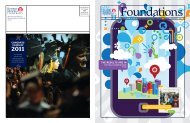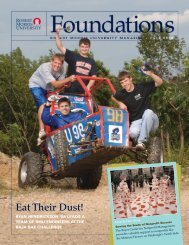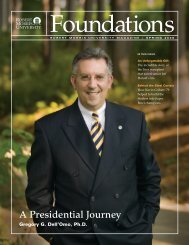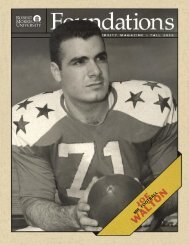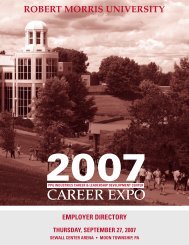Kozol, J. (1995).Amazing Grace: The Lives of Children and the ...
Kozol, J. (1995).Amazing Grace: The Lives of Children and the ...
Kozol, J. (1995).Amazing Grace: The Lives of Children and the ...
You also want an ePaper? Increase the reach of your titles
YUMPU automatically turns print PDFs into web optimized ePapers that Google loves.
On <strong>the</strong> average school day instead <strong>of</strong> just pledging allegiance to <strong>the</strong> flag <strong>and</strong> going over <strong>the</strong>school roll, <strong>the</strong>y have a slightly unusual morning routine. <strong>The</strong> teacher coaches <strong>the</strong>m by askingwhat <strong>the</strong> holes are in <strong>the</strong> window <strong>and</strong> <strong>the</strong> students reply in unison, "bullet-holes." <strong>The</strong>y <strong>the</strong>n goover a drill, very similar to a tornado drill, where <strong>the</strong>y practice getting down if <strong>the</strong>y heargunshots. According to Maslow's Hierarchy <strong>of</strong> Needs, students have certain needs that must bemet before <strong>the</strong>y are able to learn in a school environment. How do children learn when <strong>the</strong>y arelistening to <strong>the</strong> sound <strong>of</strong> <strong>the</strong>ir empty bellies rumbling <strong>and</strong> listening to hear a bullet shot before itleaves <strong>the</strong> gun? How can we dem<strong>and</strong> high test scores <strong>and</strong> work completed correctly when <strong>the</strong>personal hunger <strong>and</strong> safety needs <strong>of</strong> <strong>the</strong> students continue to be unmet even in <strong>the</strong> classroom?According to <strong>the</strong> principal, <strong>the</strong>re are many students who bring to <strong>the</strong> school physical evidence <strong>of</strong>pain <strong>and</strong> hardship. Some wear <strong>the</strong>ir pain in <strong>the</strong> form <strong>of</strong> <strong>the</strong> inhalers that almost every childcarries for asthma <strong>and</strong> some with burns from fires in <strong>the</strong>ir neighborhoods. He explained, "Some<strong>of</strong> our children have been horribly disfigured in fires. I notice, though, that <strong>the</strong> o<strong>the</strong>r childrentreat <strong>the</strong>m kindly <strong>and</strong> not make fun <strong>of</strong> <strong>the</strong>m. <strong>The</strong>re is a protective feeling that can beextraordinarily moving. <strong>The</strong>re is nothing predatory in <strong>the</strong>se children. <strong>The</strong>y know that <strong>the</strong> worlddoes not much care for <strong>the</strong>m <strong>and</strong> <strong>the</strong>y try hard to be <strong>the</strong>re for each o<strong>the</strong>r." (p. 64)Self-efficacy is not high in this school <strong>and</strong> it becomes apparent when you hear <strong>the</strong> voices <strong>of</strong> <strong>the</strong>children in this book. <strong>The</strong>y see how o<strong>the</strong>rs view <strong>the</strong>ir environment. <strong>The</strong> self-esteem <strong>of</strong> childrenhas been crushed to <strong>the</strong> degree that students ridicule <strong>the</strong>mselves, as David Washington toldJonathan, by making a bitter joke out <strong>of</strong> <strong>the</strong> letters <strong>of</strong> <strong>the</strong> school's name. "'Taft,'" <strong>the</strong>y say means"Training Animals For Tomorrow." (p.152) <strong>The</strong> students see that <strong>the</strong>y do not get an equaleducation compared to o<strong>the</strong>r students in <strong>the</strong> city. <strong>The</strong>se are not students who are unintelligent;<strong>the</strong>y were simply dealt a bad h<strong>and</strong>. <strong>The</strong> question that one wants to ask is: What do o<strong>the</strong>r kidsdeserve <strong>and</strong> how is <strong>the</strong> whole idea <strong>of</strong> a "deserving" or an "undeserving" person used to masksome <strong>of</strong> <strong>the</strong> cumulative consequences <strong>of</strong> injustice? (p.154)<strong>The</strong>re are children who do not have bedrooms; but one adolescent named Anthony who sticksout in this book as one <strong>of</strong> <strong>the</strong> hopes <strong>of</strong> Mott Haven explains that he is not ambitious for abedroom. He explains that he is "ambitious for more books." Luckily, towards <strong>the</strong> end <strong>of</strong> <strong>the</strong>book we learn that this insightful young man just may get a chance to broaden his horizonsbecause he will be going to Jerusalem with <strong>the</strong> pastor from his church. Upon reading this, <strong>the</strong>readers find <strong>the</strong>mselves cheering inside. We want <strong>the</strong>se children to get out <strong>of</strong> this situation, torise above <strong>the</strong> poverty that is drowning <strong>the</strong>m. Ano<strong>the</strong>r young man that could sing his sweet song<strong>of</strong> freedom from <strong>the</strong> poverty is named David. In <strong>the</strong> book his gr<strong>and</strong>mo<strong>the</strong>r explains that he hasjust been accepted to City University with full financial assistance. David's gr<strong>and</strong>mo<strong>the</strong>rexplains her feelings about this fantastic news to Jonathan: "I'm happy," she says, smilingthrough her tears, <strong>and</strong> she keeps saying it, "I'm happy. Something good has happened,something GOOD! No one can take that from him now." (p. 236) It is <strong>the</strong> first time that <strong>Kozol</strong>saw her cry that way, without embarrassment, without constraint, without trying to conceal,because <strong>the</strong>y were tears <strong>of</strong> hope for this generation.That saved a wretch like me....



